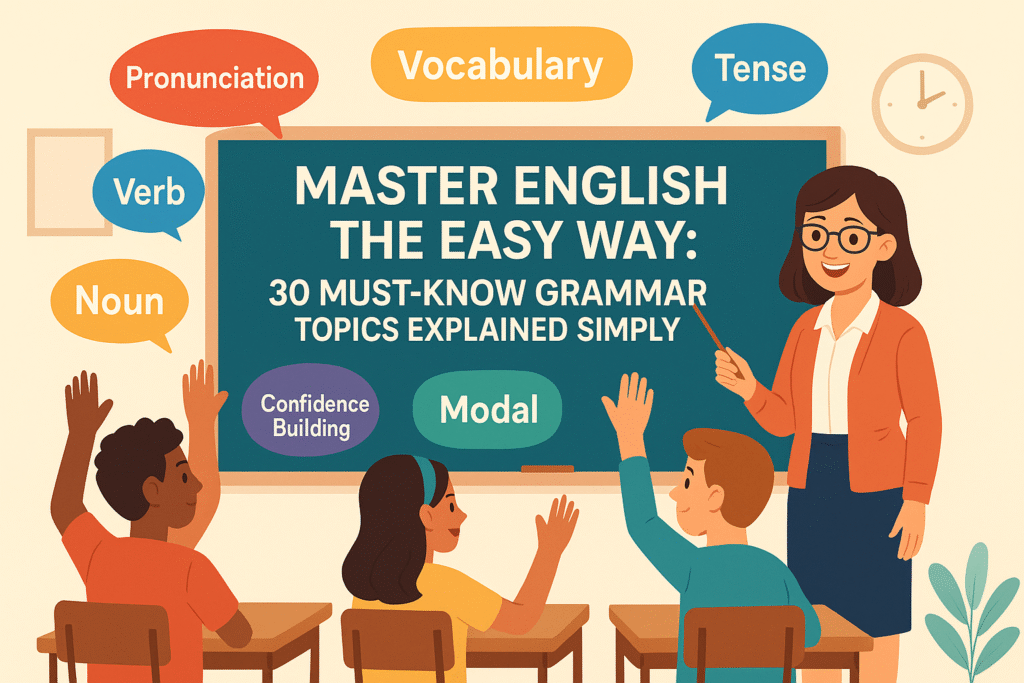Whether you’re starting your English journey or want to polish your grammar skills, this guide gives you easy explanations and comprehensive practice points to help you understand and use English confidently.

1. Nouns
Nouns are naming words that identify people, places, things, or ideas.
👉 Examples: teacher, school, book, happiness
2. Pronouns
Pronouns replace nouns to avoid repetition.
👉 Examples: he, she, it, we, they, you, me, him, her
Instead of: “The teacher is kind.” → “She is kind.”
3. Verbs
Verbs show actions or states of being.
👉 Action: run, eat, write
👉 State: is, are, was, seem
4. Adjectives
Adjectives describe nouns and tell us more about them.
👉 Examples: big book, happy child, blue sky
5. Adverbs
Adverbs describe verbs, adjectives, or other adverbs.
👉 Examples:
– He runs quickly. (how)
– It is very hot. (to what extent)
– She spoke quite softly. (to what extent)
6. Prepositions
Show relationships in time, space, or direction.
👉 Examples: in the box, on the table, after school
7. Conjunctions
Join words or sentences together.
👉 Examples: and, but, because, or
I like tea and coffee. / She is tired but happy.
8. Articles
Used before nouns to show if they are specific or general.
👉 Examples:
– a/an: a cat, an apple
– the: the cat on the mat
9. Tenses
Show when an action happens: past, present, or future.
👉 Examples:
– I eat. (present)
– I ate. (past)
– I will eat. (future)
10. Plurals
Tell us when there’s more than one of something.
👉 Examples: cat → cats, child → children
11. Subject-Verb Agreement
Verbs must match the subject in number.
👉 Examples:
– He is happy. (singular)
– They are happy. (plural)
12. Possessives
Show ownership or belonging.
👉 Examples: my book, John’s car, the dog’s bone
13. Questions
Used to ask for information.
👉 Examples:
– What is your name?
– Do you like pizza?
14. Negatives
Say something is not true.
👉 Examples:
– I am not tired.
– He does not like coffee.
15. Conditionals
Talk about possibilities and hypothetical situations.
👉 Examples:
– If it rains, I will stay home.
– If I had studied, I would have passed.
16. Modal Verbs
Help verbs that express ability, possibility, or necessity.
👉 Examples: can, could, must, might
– I can swim.
– You must be quiet.
17. Relative Clauses
Add more info about a noun, using who, which, that, etc.
👉 Example: The girl who is wearing a red dress is my sister.
18. Active and Passive Voice
– Active: The dog chased the cat.
– Passive: The cat was chased by the dog.
19. Reported Speech
Used to report what someone else said.
👉 Examples:
– Direct: He said, “I am tired.”
– Reported: He said he was tired.
20. Linking Words (Connectors)
Smoothly connect ideas in writing or speech.
👉 Examples: however, therefore, in addition, although
21. Inversion
Change word order for emphasis, especially after negative adverbs.
👉 Examples:
– Normal: I have never seen such a sunset.
– Inverted: Never have I seen such a sunset.
22. Cleft Sentences
Used to emphasize specific parts of a sentence.
👉 Examples:
– It was John who broke the window.
– What he needs is help.
23. Ellipsis
Omitting parts of a sentence when the meaning is still clear.
👉 Examples:
– Are you going? Yes, I am.
– Want some? (instead of “Do you want some?”)
24. Fronting
Move a sentence part to the front for emphasis.
👉 Examples:
– Normal: I like this book a lot.
– Fronted: This book I like a lot.
25. Advanced Modal Verbs
Used for complex ideas like past possibility, regret, or deduction.
👉 Examples:
– He might have gone home.
– I could have helped you.
– She must have been tired.
26. Subjunctive Mood
Used in formal English for wishes or suggestions.
👉 Examples:
– I wish he were here.
– The doctor suggested that he take a rest.
27. Discourse Markers
Help guide conversations and show attitude.
👉 Examples: well, actually, anyway, in fact, so
28. Tense and Aspect (Deep Dive)
– Simple: I ate.
– Continuous: I was eating.
– Perfect: I had eaten.
– Perfect Continuous: I had been eating.
29. Collocations
Natural word combinations that sound right together.
👉 Examples:
– Strong: torrential rain, bitter cold
– Common: make a mistake, do homework
30. Figurative Language
Creative expressions that go beyond literal meaning.
👉 Examples:
– Metaphor: Time is a thief.
– Simile: Brave as a lion
– Personification: The wind whispered
– Irony/Sarcasm: “Oh great, another meeting!” (when annoyed)
This list is your quick and friendly guide to mastering English grammar. Each topic is made simple so you can understand fast and practice confidently.